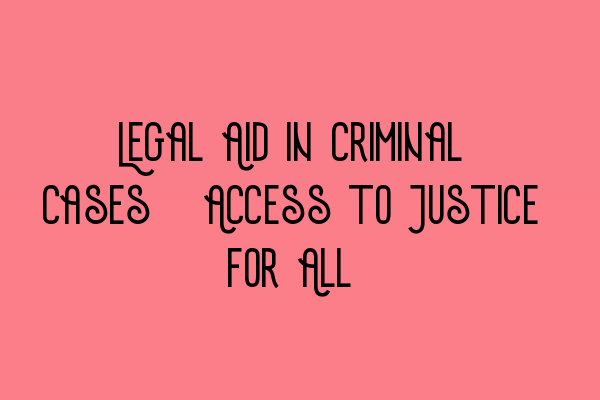Legal Aid in Criminal Cases: Access to Justice for All
At SQE Criminal Law & Practice Law UK, we firmly believe in the importance of legal aid in criminal cases to ensure access to justice for all. Legal aid is a fundamental right that allows individuals who cannot afford legal representation to receive professional help and guidance in court. In this blog post, we will delve into the significance of legal aid, its impact on the criminal justice system, and the challenges it faces today.
The Importance of Legal Aid
Legal aid plays a crucial role in upholding the principle of “innocent until proven guilty” and ensuring a fair trial for all individuals. It provides essential support to vulnerable individuals who may be intimidated by the complexities of the legal system or lack the financial resources to hire a private attorney.
By providing legal aid in criminal cases, we are leveling the playing field and preventing potential miscarriages of justice. It allows everyone, regardless of their socio-economic status, to receive proper legal representation and present their case effectively in court.
Challenges Faced by Legal Aid
While legal aid is indispensable, it is facing numerous challenges in today’s legal landscape. One of the biggest challenges is insufficient funding. The lack of adequate funding restricts the availability of legal aid services, leading to an imbalance in access to justice.
Additionally, the eligibility criteria for legal aid often leave many individuals without the necessary support. Striking a balance between ensuring access to justice and managing limited resources is a complex task that requires ongoing evaluation and reform.
The Impact on the Criminal Justice System
Legal aid plays a pivotal role in maintaining the integrity of the criminal justice system. It enhances public trust and confidence by ensuring that individuals are afforded their constitutional and human rights throughout the legal process.
Without legal aid, the system would be burdened with self-represented litigants who may struggle to navigate complex legal procedures. This can result in delays, inefficiencies, and potentially wrongful convictions.
How Can We Improve Access to Legal Aid?
To improve access to legal aid, various measures can be taken. First and foremost, increased funding is essential to expand the availability of legal aid services to those in need. Adequate financial resources will help bridge the access gap and prevent individuals from being denied their right to quality legal representation.
Furthermore, it is crucial to regularly review and refine the eligibility criteria for legal aid to ensure that it covers a wider range of individuals who require assistance. This includes considering factors such as income thresholds, circumstances of the case, and vulnerability.
Conclusion
Legal aid is a cornerstone of our criminal justice system. It empowers individuals, promotes fairness, and maintains public trust. However, it is imperative to address the challenges faced by legal aid to ensure that access to justice is truly available for all.
